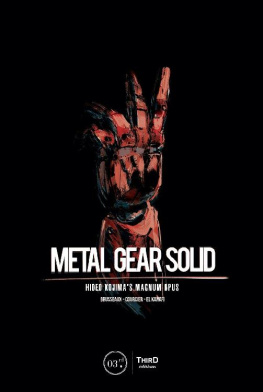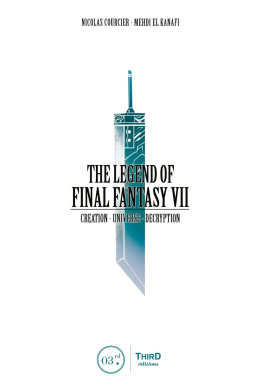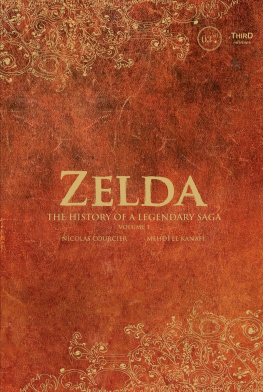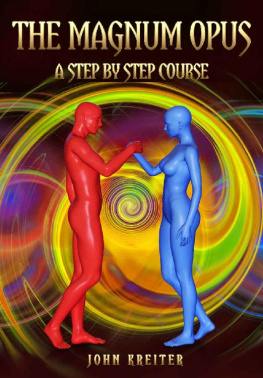Nicolas Courcier - Metal Gear Solid: Hideo Kojimas Magnum Opus
Here you can read online Nicolas Courcier - Metal Gear Solid: Hideo Kojimas Magnum Opus full text of the book (entire story) in english for free. Download pdf and epub, get meaning, cover and reviews about this ebook. year: 2017, publisher: Third Editions, genre: Science fiction. Description of the work, (preface) as well as reviews are available. Best literature library LitArk.com created for fans of good reading and offers a wide selection of genres:
Romance novel
Science fiction
Adventure
Detective
Science
History
Home and family
Prose
Art
Politics
Computer
Non-fiction
Religion
Business
Children
Humor
Choose a favorite category and find really read worthwhile books. Enjoy immersion in the world of imagination, feel the emotions of the characters or learn something new for yourself, make an fascinating discovery.
- Book:Metal Gear Solid: Hideo Kojimas Magnum Opus
- Author:
- Publisher:Third Editions
- Genre:
- Year:2017
- Rating:3 / 5
- Favourites:Add to favourites
- Your mark:
- 60
- 1
- 2
- 3
- 4
- 5
Metal Gear Solid: Hideo Kojimas Magnum Opus: summary, description and annotation
We offer to read an annotation, description, summary or preface (depends on what the author of the book "Metal Gear Solid: Hideo Kojimas Magnum Opus" wrote himself). If you haven't found the necessary information about the book — write in the comments, we will try to find it.
Metal Gear Solid: Hideo Kojimas Magnum Opus — read online for free the complete book (whole text) full work
Below is the text of the book, divided by pages. System saving the place of the last page read, allows you to conveniently read the book "Metal Gear Solid: Hideo Kojimas Magnum Opus" online for free, without having to search again every time where you left off. Put a bookmark, and you can go to the page where you finished reading at any time.
Font size:
Interval:
Bookmark:
Metal Gear Solid. Hideo Kojimas Magnum Opus
by Denis Brusseaux, Nicolas Courciere and Mehdi El Kanafi
is published by Third ditions
32 rue dAlsace-Lorraine, 31000 TOULOUSE, FRANCE
contact@thirdeditions.com
www.thirdeditions.com
Follow us:  Third_Editions
Third_Editions  Facebook.com/ThirdEditions
Facebook.com/ThirdEditions
All rights reserved. No part of this publication may be reproduced or transmitted, in any form, without the prior written permission of the copyright holder.
Any copy or reproduction, by any means, is a breach of copyright and liable to the penalties provided under the French Copyright Act No. 57-298 of 11 March 1957.
The Third logo is a trademark of Third ditions, registered in France and other countries.

Editors: Nicolas Courcier and Mehdi El Kanafi
Authors: Denis Brusseaux, Nicolas Courcier and Mehdi El Kanafi
Chapter VIII: Damien Mecheri
Proofreading and layout: Thomas Savary
Covers: Nikita Kaun (classic) and Johann Papayou Biais (First Print)
Cover layout: Frdric Tom
Translated from French by: Jason Mulvaney (ITC Traductions)
This resource guide has been produced by Third ditions as an homage to the great video game series Metal Gear and Metal Gear Solid.
Its authors retrace the history to the video game series of Metal Gear and Metal Gear Solid in this unique compendium, which reveals the inspiration, background and content of the games through reflections and original analyses.
Metal Gear Solid is a registered trademark of Konami Digital Entertainment. All rights reserved. The cover design is inspired by the artwork of Yoji Shinkawa, the character designer of Metal Gear Solid V: The Panthom Pain.
English edition, copyright 2017, Third ditions. All rights reserved.
ISBN: 979-10-94723-61-6


The Metal Gear saga can be easily summarized. Each game describes the adventures of a spy on a mission to neutralize a nuclear threat, which comes in the form of a Metal Gear, a bipedal tank equipped with nuclear weapons that can reach any location in the world. An ordinary enough synopsis, yet behind it lurks a series of untold, uncommon richness. Even though you play a secret agent in Metal Gear, it would be difficult to place this saga solely in the stealth genre or to reduce it to any other category on the basis of an isolated aspect. In the end, the only term that could suit it is the name of its creator: Hideo Kojima. Although the titles that make up the entire series have been developed by a team, its progenitors aura is so inextricably linked to his work that the game cannot be appreciated without studying the man behind it. The designer knew how to place his own personal mark on the series, which highlights the individuality of each episode beyond the realm of the traditional value judgment. From the storytelling and plot to the gameplay mechanics, nothing of what Kojima produced has an equal elsewhere in video games.
The mythology of the series is so rich and dense that it is only possible to grasp the different Metal Gear episodes through this prism alone. On the other hand, the universe of these games includes numerous real events and puts into perspective historical periods, organizations and well-known figures, such as the Cold War, the Pentagon and certain world leaders. But the illustrative power of the hero supplants the parallels that could be made with reality. The temporal context moves to the background and leaves the scene free for the characters to shape an exceptional fiction.
Metal Gear is not just a succession of games set against a similar backdrop, it is an endeavor created as a whole, aimed at transmitting clear messages. The series thus coincides with the development of a discourse, an aspiration, but it also attests to imperfections and failings. A creators soul is not plain; in fact, it is rough and marked by vicissitudes. The study of the Metal Gear series turns out to be as singular as the game it examines. In fact, despite the impossibility of being exhaustive, Konamis official database fulfills this function very well. We wanted to avoid creating just an encyclopedic work, so our endeavor presents biases that could appear radical to some people, but their arrangement offers a cross-sectional insight into the franchises entire collection. Happy reading!
Nicolas Courcier and Mehdi El Kanafi were print media fans from a young age and did not wait long to launch their first magazine, Console Syndrome, in 2004. After five issues with a limited distribution in the Toulouse region, they decided to create a publishing house under the same name. A year later, the small business was bought by a major publisher in the area of video game guides and books. Over the next four years, Nicolas and Mehdi published more than twenty books devoted to major game franchises, many being their own work, such as Zelda: The History of a Legendary Saga, Resident Evil: Of Zombies and Men, and The Legend Final Fantasy VII and IX. Since 2015, they have continued their publishing careers based around analyzing the great video game sagas as part of a new publishing house that they co-founded: Third.
Denis Brusseaux
Educated in law, Denis Brusseaux has worked as a journalist for fifteen years and is a specialist in the two arts that he loves: cinema and video games. He has contributed to the magazines Joypad and Videogamer, and the website DVDrama. He also co-wrote the 2012 film The Lookout (French title: Le Guetteur), which starred Daniel Auteuil and Mathieu Kassovitz.

Konami was founded in 1969 by Kagemasa Kozuki, Yoshinobu Nakama and Tatsuo Miyasako. Although konami means small wave in Japanese, the companys name is first and foremost an amalgamation of the initial syllable in each of the three founders names. In its beginnings, the business was a jukebox rental and repair shop located in Osaka; however, from the mid-1970s, the company became interested in the video-game market. In 1981, Frogger was released in the arcades: the player helped frogs cross a busy highwaya cult game if ever there was one. Konami then invested in the shoot-em up genre with Gradius (1985), one of the most famous horizontal-scrolling games of the genre, without forgetting its quirky parody, Parodius (1990). Many action games began to be released in the arcades, the most famous being Green Beret (1985) and Contra (1987). In 1985, Konami developed what would become one of the predecessors to modern fighting games: Yie Ar Kung-Fu, which presented the opportunity to control who took on different adversaries, each one with a particular fighting style.
The publisher then quickly entered the game console market and adapted its hits for the machines of that era: MSX, Atari VCS, Megadrive, etc. It was through establishing subsidiaries such as Ultra Software in Europe and Palcom Software in North America that Konami, which had begun manufacturing games for the Nintendo Entertainment System, managed to bypass the restrictions imposed by the Kyoto-based Nintendo. These restrictions limited each publisher to releasing only five titles per year. Later, official branches would open in these western regions.
Next pageFont size:
Interval:
Bookmark:
Similar books «Metal Gear Solid: Hideo Kojimas Magnum Opus»
Look at similar books to Metal Gear Solid: Hideo Kojimas Magnum Opus. We have selected literature similar in name and meaning in the hope of providing readers with more options to find new, interesting, not yet read works.
Discussion, reviews of the book Metal Gear Solid: Hideo Kojimas Magnum Opus and just readers' own opinions. Leave your comments, write what you think about the work, its meaning or the main characters. Specify what exactly you liked and what you didn't like, and why you think so.












